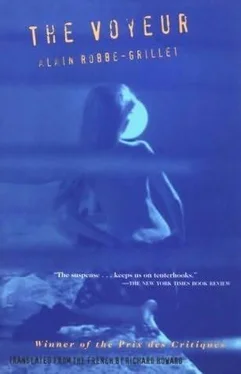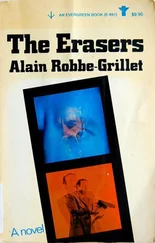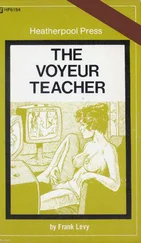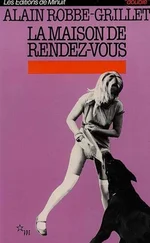Alain Robbe-Grillet
THE VOYEUR
Translated by Richard Howard
It was as if no one had heard.
The whistle blew again—a shrill, prolonged noise followed by three short blasts of ear-splitting violence: a violence without purpose that remained without effect. There was no more reaction—no further exclamation—than there had been at first; not one feature of one face had even trembled.
A motionless and parallel series of strained, almost anxious stares crossed—tried to cross—struggled against the narrowing space that still separated them from their goal. Every head was raised, one next to the other, in an identical attitude. A last puff of heavy, noiseless steam formed a great plume in the air above them, and vanished as soon as it had appeared.
Slightly to one side, behind the area in which the steam had just appeared, one passenger stood apart from the expectant group. The whistle had had no more effect on his withdrawal than on the passionate attention of his neighbors. Standing like them, his body and limbs rigid, he kept his eyes on the deck.
He had often heard the story before. When he was still a child—perhaps twenty-five or thirty years ago—he had had a big cardboard box, an old shoebox, in which he collected pieces of string. Not any string, not scraps of inferior quality, worn, frayed bits that had been spoiled by overuse, not pieces too short to be good for anything.
This one would have been just right. It was a thin hemp cord in perfect condition, carefully rolled into a figure eight, with a few extra turns wound around the middle. It must be pretty long—a yard at least, perhaps two. Someone had probably dropped it by mistake after having rolled it up for future use—or else for a collection.
Mathias bent down to retrieve it. As he straightened up again he noticed, a few feet to the right, a little girl of seven or eight gravely staring at him, her eyes enormous and calm. He smiled hesitantly, but she did not bother to smile back, and it was only after several seconds that he saw her eyes shift toward the wad of string he was holding at the level of his chest. He was not disappointed by a closer look: it was a real find—not too shiny, firmly and regularly twisted, and evidently very strong.
For a moment he thought he recognized it, as if it were something he had lost long ago. A similar cord once must have occupied an important place in his thoughts. Would it be with the others in the shoebox? His memory immediately edged away toward the indefinite light of a rainy landscape, in which a piece of string played no perceptible part.
He had only to put it in his pocket. But no sooner had he begun the gesture than he stopped, his arm half-bent, undecided, gazing at his hand. He saw that his nails were too long, which he already knew. He also noticed that in growing their shape had become exaggeratedly pointed; naturally he did not file them to look like that.
The child was still staring in his direction, but it was difficult to be sure she was looking at him and not at something behind him, or even at nothing at all; her eyes seemed almost too wide to be able to focus on a single object, unless it was one of enormous size. She must have been looking at the sea.
Mathias let his arm fall to his side. Suddenly the engines stopped. The vibration ceased at once, as well as the continuous rumbling sound that had accompanied the ship since its departure. All the passengers remained silent, motionless, pressed close together at the entrance to the already crowded corridor through which they would eventually leave the ship. Most of them, ready for the disembarkation for some time, held their luggage in their hands, and all were facing left, their eyes fixed on the top of the pier where about twenty people were standing in a compact group, equally silent and rigid, looking for a familiar face in the crowd on the little steamer. In each group the expressions were identical: strained, almost anxious, strangely petrified and uniform.
The ship moved ahead under its own momentum, and the only sound that could be heard was the rustling of water as it slid past the hull. A gray gull, flying from astern at a speed only slightly greater than that of the ship, passed slowly on the port side in front of the pier, gliding at the level of the bridge without the slightest movement of its wings, its head cocked, one eye fixed on the water below—one round, indifferent, inexpressive eye.
There was the sound of an electric bell. The engines started up again. The ship began to make a turn that brought it gradually closer to the pier. The coast rapidly extended along the other side: the squat lighthouse striped black and white, the half-ruined fort, the sluice gates of the tidal basin, the row of houses on the quay.
“She’s on time today,” said a voice. “Almost,” someone corrected—perhaps it was the same voice.
Mathias looked at his watch. The crossing had lasted exactly three hours. The electric hell rang again; then once more, a few seconds later. A gray gull resembling the first one passed by in the same direction, following the same horizontal trajectory in the same deliberate wav—wings motionless, head cocked, beak pointing downward, one eye fixed.
The ship didn’t seem to be moving in any direction at all. But the noise of violently churning water could be heard astern. The pier, now quite close, towered several yards above the deck. The tide must have been out. The landing slip from which the ship would be boarded revealed the smoother surface of its lower section, darkened by the water and half-covered with greenish moss. On closer inspection, the stone rim drew almost imperceptibly closer.
The stone rim—an oblique, sharp edge formed by two intersecting perpendicular planes: the vertical embankment perpendicular to the quay and the ramp leading to the top of the pier—was continued along its upper side at the top of the pier by a horizontal line extending straight toward the quay.
The pier, which seemed longer than it actually was as an effect of perspective, extended from both sides of this base line in a cluster of parallels describing, with a precision accentuated even more sharply by the morning light, a series of elongated planes alternately horizontal and vertical: the crest of the massive parapet that protected the tidal basin from the open sea, the inner wall of the parapet, the jetty along the top of the pier, and the vertical embankment that plunged straight into the water of the harbor. The two vertical surfaces were in shadow, the other two brilliantly lit by the sun—the whole breadth of the parapet and all of the jetty save for one dark narrow strip: the shadow cast by the parapet. Theoretically, the reversed image of the entire group could be seen reflected in the harbor water, and, on the surface, still within the same play of parallels, the shadow cast by the vertical embankment extending straight toward the quay.
At the end of the jetty the structure grew more elaborate; the pier divided into two parts: on the parapet side, a narrow passageway leading to a beacon light, and on the left the landing slip sloping down into the water. It was this latter inclined rectangle, seen obliquely, that attracted notice; slashed diagonally by the shadow of the embankment it skirted, it showed up as one dark triangle and one bright. All other surfaces were blurred. The water in the harbor was not calm enough for the reflection of the pier to be distinguished. Similarly the shadow of the pier appeared only as a vague strip constantly broken by surface undulations. The shadow of the parapet on the jetty tended to blend into the vertical surface which cast it. Jetty and parapet alike were still encumbered with drying fish, empty crates, large wicker baskets—crayfish and lobster traps, oyster hampers, crab snares. The crowd gathered for the ship’s arrival circulated with some difficulty among the various piles of objects.
Читать дальше












